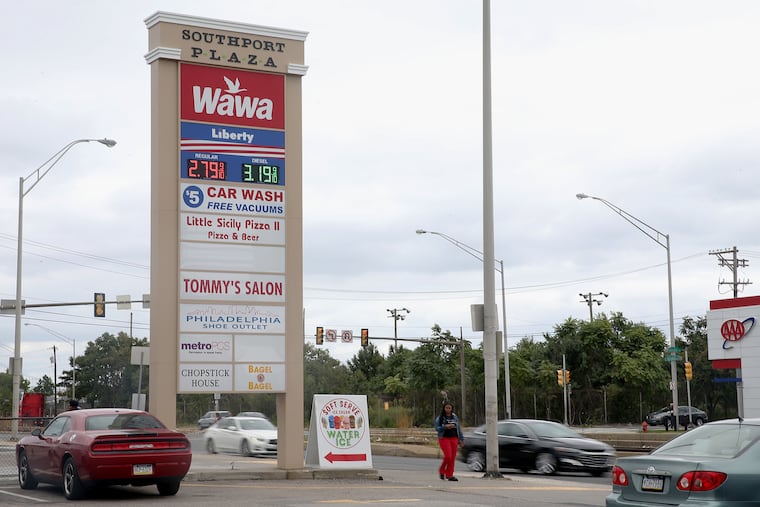Blatstein ploy clears way for Wawa gas pumps along Delaware River
Lawyers for Bart Blatstein have come up with a zoning maneuver to build a Wawa gas station along the waterfront site.

Developer Bart Blatstein wanted to build a Wawa filling station on land he owns near the Delaware River waterfront, but gas pumps aren’t permitted along South Columbus Boulevard, the busy road that runs beside the property.
So he got rid of that Columbus Boulevard frontage — on paper, at least — with a cunning technical move: He carved a 20-foot-wide strip of his property between the road and the gas station site into its own legal parcel.
Now the proposed filling station fronts onto the buffer, rather than the road, solving Blatstein’s zoning quandary, Matt McHugh, a lawyer for the developer, said Wednesday night at a presentation to the Pennsport Civic Association.
"It changes the legal standard upon which the pumps would be permitted,” he said.
That explanation frustrated community members at the meeting.
“You’re forcing it down our throats, and that’s not fair,” said Lisa Grivnovics, 62, a lifelong Pennsport resident.
McHugh’s presentation was a required step before his team seeks final approvals from Philadelphia’s zoning board, which still must sign off on the gas pumps themselves. Blatstein did not attend.
The meeting followed a ruling by the city’s Department of Licenses and Inspections that accepted Blatstein’s workaround, including a feature that makes the Wawa and gas pumps accessible from Columbus Boulevard, using a driveway that crosses the buffer.
“It is wonky and weird, but they pulled it off,” said L&I spokesperson Karen Guss. “They figured out the puzzle in a way that gets them their gas station.”
Neither Blatstein nor Wawa responded to messages seeking comment.
Blatstein’s so-far successful solution has left him within striking distance of his years-long quest to plant a Wawa on part of the 21-acre property he acquired in 2014 after a failed effort to build a Foxwoods casino there.
The Wawa store and filling station would rise on the southwest quadrant of the tract, which is bounded by Columbus Boulevard and the river, between Reed and Tasker Streets. Other sections of the property have been designated for a Lidl supermarket, apartments, and rowhouses.
While the Wawa proposal first came to light more than four years ago, Blatstein didn’t begin formally seeking permits for the project until late 2017. The developer lost that round, with L&I turning down his application due to zoning guidelines that prohibit fueling stations on Columbus Boulevard. Those rules were put in place to stop projects that discourage pedestrian access to the river.
Blatstein’s most direct path to having the project approved then would have been to persuade the city’s zoning board that the property couldn’t be otherwise profitably developed. But requests for “variances,” as they are known, are typically better received by the zoning board when the proposal is also backed by community members, and Blatstein’s plan enjoyed little such support. He withdrew his application for the project the following spring.
McHugh said Blatstein’s Tower Investments Inc. resumed its Wawa push because it was unable to find another “suitable” user for the site. He and Tower executive vice president Tina Roberts, who was also at the community meeting, wouldn’t answer community members’ questions about what other occupants were considered.
Blatstein’s new Wawa application was filed Feb. 25, a day before new legislation went into effect designating Tasker Street as a waterfront-access road, Pennsport Civic Association president Patrick Fitzmaurice said. Had those rules been in place, a gas station would not have been permitted along the street.
While the parcel-splitting strategy was accepted by L&I, the agency did instruct Blatstein’s team that the gas pumps themselves would require a “special exception." Those are handled by the city’s zoning board, but are granted much more routinely. McHugh said he will argue that the project deserves a special exception when he appears before zoning board members on Sept. 25 because “it fits the character” of the community.
Neighbors at the meeting met that characterization with groans and guffaws.
Fitzmaurice said in a statement that his group was considering its next steps in response to the proposal, but that members planned to attend the zoning board meeting.
“We are disappointed the developer failed to take the opportunity to find a use for this parcel that follows the spirit of the vision agreed upon by the waterfront communities and stakeholders,” he said. "We [are] deeply concerned about ... the legal maneuvering to avoid the clear wishes of the neighborhood ... and the precedent this will set.”
Those sentiments were also expressed by people at Wednesday night’s meeting.
“The fact of the matter is, the gas pumps are not something we want,” said Pennsport resident Michelle Silenzio-Franklin, 53. "It’s going to be a problem.”
Joe Forkin, president of the Delaware River Waterfront Corp., a government-affiliated nonprofit that oversees development along central Philadelphia’s Delaware River waterfront, criticized Blatstein’s team for violating the spirit of the waterfront’s zoning laws.
“It detracts from the walkability,” he said. “The congestion that you’re seeing — we have to start making steps in the opposite direction of that, so the community can easily get to the riverfront and can stroll along it or bike along it.”